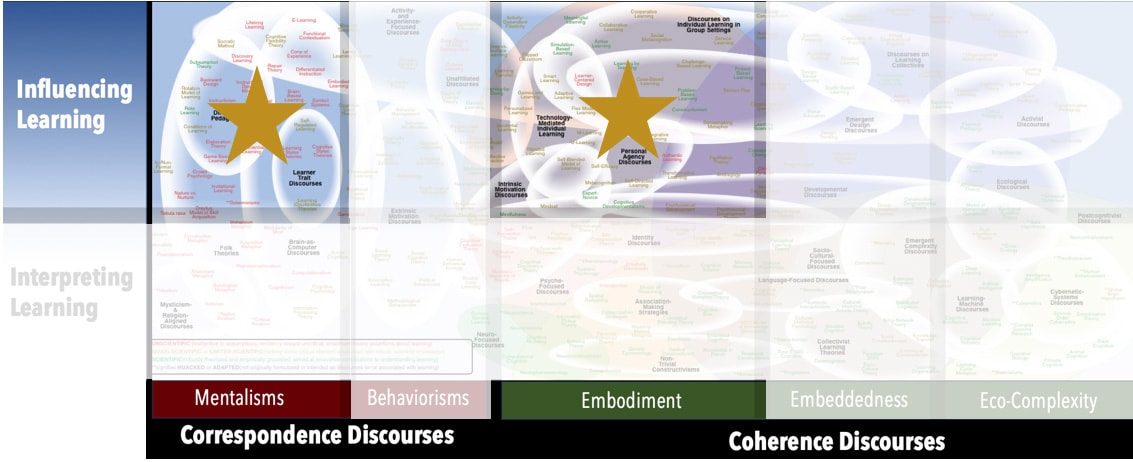Focus
Amplifying insights and efficacy through critical self-analysisPrincipal Metaphors
The notion of “reflect” in Reflective Practice signals an alignment with the Illumination Metaphor:- Knowledge is … enlightenment; all that has been illuminated
- Knowing is … seeing, insight
- Learner is … one in the dark
- Learning is … reflecting
- Teaching is … shining a light on; highlighting
Originated
1970sSynopsis
Reflective Practice refers to both one’s inclinations and abilities to reflect – that is, to critically review one’s actions, responses, interpretations, and motivations – as an integral aspect of one’s learning. Multiple descriptive and/or prescriptive models have been proposed, with varying levels of sophistication. Models typically involve sequences of describing, analyzing, planning, and implementing. Reflective Practice is often associated with:- Praxis – a conscious attitude to unite theory-and-practice or thought-and-action, dating back to the ancient Greeks. Activist Discourses take the notion a step further, using Praxis to bring together reflective action and critical theorizing.
- Reflective Consciousness (Self-Reflection) – the capacity of consciousness to be critically aware of itself
- Retrospection – consciously reviewing previous experience, usually from the more distant past. Retrospection is an aspect of most Psychotherapy techniques and Psychoanalytic Theories.
- Self-Consciousness – the tendency to think about oneself. In Psychology, it is defined in terms of Reflective Consciousness (see above), and two varieties are identified:
- Private Self-Consciousness – one’s thoughts about internal aspects (e.g., thoughts, emotional responses, preferences)
- Public Self-Consciousness – one’s thoughts about publicly observable aspects of oneself (e.g., appearance, mannerisms, activities)
- Critical Praxis (Paulo Freire, 1970s) – an elaboration of the notion of Praxis to the space of collectivity – involving self-reflection, reflective action, and collective reflective action
- Gibbs’ Reflective Cycle (Graham Gibbs, 1980s) – a structured model for reflection, guiding individuals through six stages: Description, Feelings, Evaluation, Analysis, Conclusion, and Action Plan
- Reflective Learning (Evelyn Boyd, 1980s) – the incorporation of deliberate reflection on one’s learning experiences. Reflective Learning is often associated with Metacognition and with Transformative Learning.
- Video-Based Reflection (various, 2000s) – a type of Reflective Practice that’s based on video recordings rather than journaling or other means of tracking memories and insights
Commentary
Criticisms of Reflective Practice tend to revolve around accusations that its insights and advice are trivial, informed by the realization that an integral aspect of human cognition is iterative development. Reflective Practice seems to be little more than a formalization of this necessary process, layering a “critically” into the common admonition to “think about what you’re doing.” Some proponents of Reflective Practice have attempted to link it to Second-Order Cybernetics in suggestion that reflection constitutes a “second loop” or “double loop” in one’s cognition. This suggestion is worrisome in its naiveté; it is a trivialized interpretation of a complex, recursive dynamic that is argued to be integral to awareness.Authors and/or Prominent Influences
John Dewey; Donald SchönStatus as a Theory of Learning
Reflective Practice is a not a theory of learning. Rather, with regard to theories of learning, it is an application of a principle of learning that is common to most perspectives.Status as a Theory of Teaching
Reflective Practice is, in essence, a theory of self-teaching.Status as a Scientific Theory
Substantial empirical evidence has been gathered to show that deliberate and critical attention to one’s actions can contribute to more sophisticated understandings and more nuanced actions. However, that realization is neither unique to Reflective Practice (e.g., it’s an assumption that underlies the work of most counselors and therapists), nor one that relies on or affords deep insights into the human mind. Consequently, Reflective Practice does not meet our criteria of a scientific theory.Subdiscourses:
- Critical Praxis
- Gibbs’ Reflective Cycle
- Praxis
- Private Self-Consciousness
- Public Self-Consciousness
- Reflective Consciousness (Self-Reflection)
- Reflective Learning
- Retrospection
- Self-Consciousness
- Video-Based Reflection
Map Location

Please cite this article as:
Davis, B., & Francis, K. (2025). “Reflective Practice” in Discourses on Learning in Education. https://learningdiscourses.com.
⇦ Back to Map
⇦ Back to List
